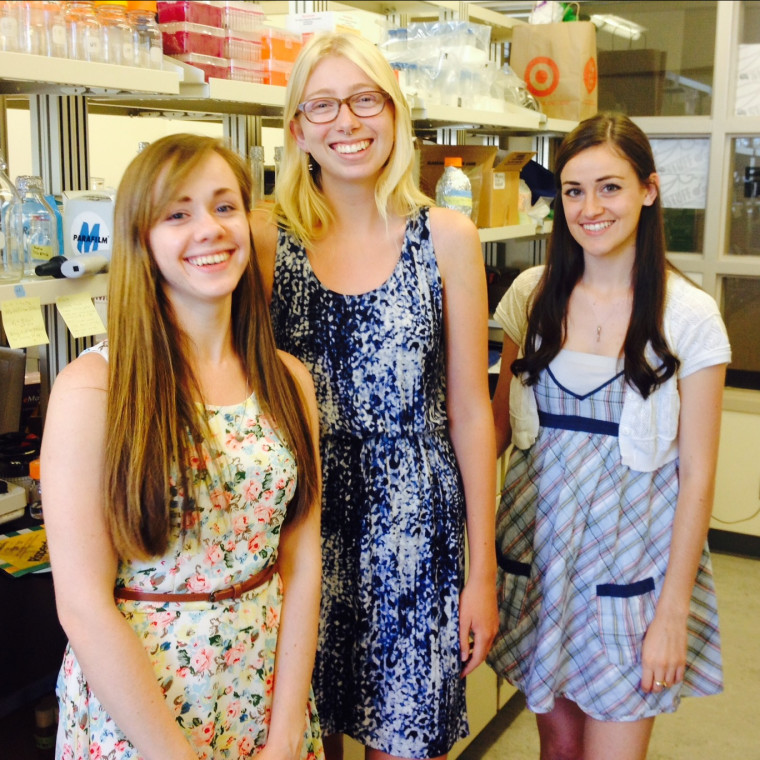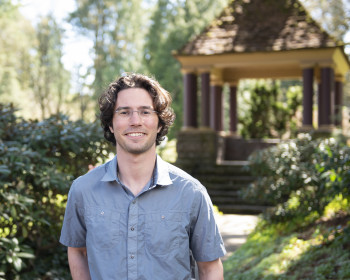Summer student research: Flies and nicotine
Demi Glidden ’16, Jennifer Lakeman ’16, and Melanie Morris ’15 have been working with Assistant Professor of Biology Norma Velázquez Ulloa to study the biological impacts of nicotine on fruit flies. They reflect on this experience in the following Q&A.
Open gallery

Lewis & Clark students remain closely engaged with their fields of study during the summer months, and many make meaningful contributions to scholarship by collaborating with faculty on innovative research.
Demi Glidden ’16, Jennifer Lakeman ’16, and Melanie Morris ’15 have been working with Assistant Professor of Biology Norma Velázquez Ulloa to study the biological impacts of nicotine on fruit flies. They reflect on this experience in the following Q&A.
What are you researching?
In the fly lab, we study mechanisms of behavioral, neuronal, and genetic tolerance to nicotine. We want to know how and why tolerance occurs on these levels.
What initially sparked your interest in this project, and how does it relate to your previous coursework?
Demi: I was excited about this project because it has very immediate real-world applications. Nicotine is a pervasive drug that we know very little about, and learning about tolerance in general is useful for treating drug addiction. I also really enjoyed working with flies in my coursework for Investigations in Genetics and Evolutionary Biology, so I liked the idea of continuing to learn about and work with such an incredible model organism.
Jennifer: I am interested in biology at the anatomical, cellular, and molecular levels. The fly lab conveniently combines all three. I have taken Lewis & Clark courses in cellular and molecular biology, but this project gives me the chance to finally explore anatomy and physiology.
Melanie: My favorite subjects of study at Lewis & Clark have been neuroscience, genetics, and biochemistry. Professor Velázquez Ulloa’s work melds these three areas to address interesting and relevant questions about nicotine addiction. I knew that I wanted to be involved in that kind of work.
How has your Lewis & Clark education been enhanced by close collaboration with faculty?
Demi: Connecting with faculty members is one of the most important things I’ve done with my time at Lewis & Clark because they have so much more to teach than can be taught in the classroom. Lectures, labs, discussions, homework, and exams are the backbone of any worthwhile education, but I find that my experiences of doing research with faculty have most shaped my goals and dreams for life after college.
Jennifer: Developing relationships with faculty members has been an integral part of my Lewis & Clark experience, and if it weren’t for their recommendations, I would not have secured this research opportunity. My professors have helped me to open more doors than I could ever open on my own.
Melanie: Close collaboration with faculty has really enriched my college education. I have received a lot of individual attention to help me improve my abilities as a scientist, which probably wouldn’t be available at a larger university.
Does your research have potential to be applied in the real world or to influence other work in your field?
Our research in the fly lab is applicable to one of the world’s most widely used drugs, responsible for many deaths and diseases each year. This project also delves into the complexities of drug addiction, a tremendously important and relevant subject of study. It will hopefully be useful to other researchers who are working on similar projects.
How will this research experience hopefully impact your future studies or professional pursuits?
Demi: This experience has definitely taught me a lot about my goals. While I am intellectually intrigued by the genetics and molecular biology that we’ve been studying here in the fly lab, I am much more inclined toward ecological and evolutionary studies. I hope to work in that area of biology next summer.
Jennifer: In addition to conducting my own research, I have been mentoring a high school student who is working on a separate project in our lab. I’ve always wanted to be a high school science teacher or to work in science education, and this experience has allowed me to develop teaching skills in a lab setting.
Melanie: This research experience has taught me to work and think like a scientist. Regardless of what field I choose to enter, I am sure that the skills I’ve learned this summer will help me to excel.
About the Rogers Science Research Program
The John S. Rogers Science Research Program allows students to pursue graduate-level research in the natural and mathematical sciences. It emphasizes strong communication skills, requiring students to publicly present their findings. This summer, more than 50 students are being sponsored to study such topics as memory formation, cybersecurity, and the impact of nicotine on flies.
“We’re not asking you, ‘What’s the answer?’ We’re saying, ‘What’s the question?’” said Michael Broide, director of the Rogers program and chair of the physics department. “I think what sets our program apart is that regardless of what project you are on, we’re all going to come together as a group to present what we’re doing in as accessible a way as possible. In science, it’s such an important skill to be able to explain cogently what you’re doing.”
Students make their final research presentations at the Rogers summer science poster session, held in conjunction with the Science Without Limits Symposium. Scheduled for September 17, the poster session is free and open to the public.
Katrina Staaf ’16 contributed to this story.
More Newsroom Stories
Public Relations is located in McAfee on the Undergraduate Campus.
MSC: 19
email public@lclark.edu
voice 503-768-7970
Public Relations
Lewis & Clark
615 S. Palatine Hill Road MSC 19
Portland OR 97219

